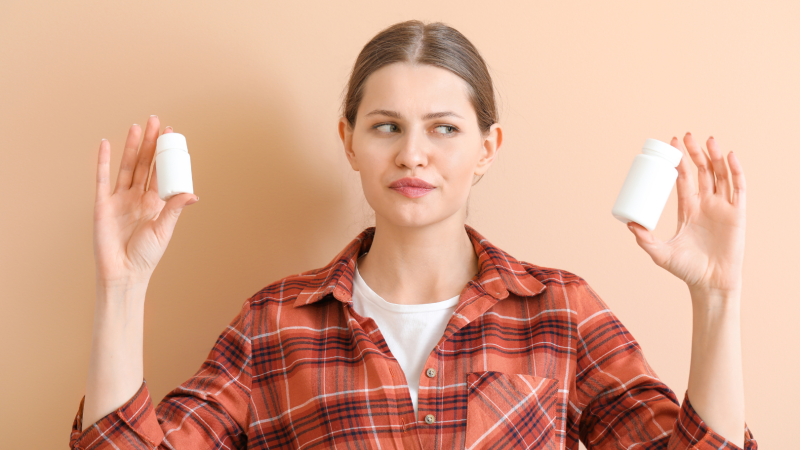
What is NMN (Nicotinamide Mononucleotide)?
Scientists studying the biology of aging have increasingly placed NMN supplementation at the center of their research, as evidence mounts for its wide-ranging effects on cellular health, metabolism, and cognitive performance.
As a direct precursor to NAD+, NMN (short for nicotinamide mononucleotide) helps your body produce the essential coenzyme that powers hundreds of biological processes in every cell.
While NAD+ (short for nicotinamide adenine dinucleotide) occurs naturally in your body, its levels decline substantially with age. This reduction correlates with many hallmarks of aging, from decreased energy levels to reduced cellular repair capacity.
Current research suggests NMN supplementation may support:
- Cellular energy production
- Metabolic health
- Cardiovascular function
- Brain performance
- Physical endurance
- Recovery and repair
- Healthy aging mechanisms
Leading longevity researchers, most famously Harvard’s David Sinclair, are now investigating how NMN supplementation might help maintain cellular function as we age. This definitive guide cuts through the noise to examine what current science tells us about NMN’s benefits, optimal usage, safety profile, and potential role in healthy aging.
In this article, you will discover:
- What NMN is and how it helps your body produce NAD+, a vital molecule that powers cellular health and declines with age
- The research-backed benefits of NMN for healthy aging, including improvements in energy production, metabolism, cardiovascular health, and brain function
- Essential guidelines for NMN supplementation, including optimal dosage, timing, safety profile, and how to select a high-quality supplement
What is NMN?
NMN is a sophisticated molecular compound classified as a nucleotide. It consists of three key components: nicotinamide (a form of vitamin B3), a ribose sugar, and a phosphate group. While this might sound technical, understanding NMN’s structure helps explain why it’s so effective: it’s essentially NAD+ minus the final piece needed for completion. This makes it a highly efficient precursor – think of it as a nearly-finished product that your body can quickly convert into NAD+.
But what makes NMN particularly special among NAD+ precursors? Unlike some other compounds, NMN is remarkably similar to naturally occurring cellular molecules. Your body produces small amounts of NMN through various pathways, primarily using nicotinamide (NAM) or nicotinamide riboside (NR) as starting materials. You also get tiny amounts when consuming certain plant and animal foods1 – though these dietary sources provide far less than what’s needed to significantly impact NAD+ levels, especially as we age.
The journey from NMN to NAD+ is more intricate than initially thought. When you take NMN orally, it undergoes several transformations before reaching your cells. Current research indicates that NMN is first broken down into simpler forms – primarily NAM and NR. This breakdown is actually necessary because NMN’s phosphate group makes it too large to easily cross cell membranes on its own.
There are two main routes for cellular entry: the primary pathway involves NMN being converted to NR, which can then enter cells efficiently. Additionally, in mice, scientists have identified a specialized transporter called Slc12a8 that may allow some direct NMN transport2, though this pathway’s significance in humans is still being studied3.
The conversion of NMN to NAD+ primarily occurs in the cytoplasm, with contributions to the nucleus and mitochondria. This widespread distribution is important because these are exactly where NAD+ is needed most – the nucleus for DNA repair, mitochondria for energy production, and cytoplasm for various metabolic processes. When you supplement with NMN, you’re essentially providing your cells with the raw material they need to produce NAD+ wherever it’s required most.
Understanding NMN’s role in NAD+ production has become increasingly important as research reveals just how central NAD+ is to cellular health. From powering fundamental metabolic functions to activating critical proteins like sirtuins (sometimes referred to as “longevity genes”), NAD+ influences hundreds of biological processes. This explains why declining NAD+ levels can have such widespread effects on health and aging – and why replacing those lost levels through NMN supplementation has generated so much scientific interest.
Key Takeaway: NMN serves as a highly efficient precursor that cells can readily convert into NAD+, a molecule essential for cellular health and longevity.
NMN to NAD+ Conversion Timeline
The Anti-Aging Effects of NMN
The potential of NMN to combat aging extends far beyond simple supplementation – it appears to work at the very foundation of cellular health. By boosting NAD+ levels, NMN triggers a cascade of biological effects that have the potential to influence virtually every aspect of age-related decline.
Cellular Rejuvenation
- NMN activates sirtuins (our “longevity genes”), which promote cellular health and resilience as we age4
- Aging mitochondria become less efficient, but NMN helps restore their function5, promoting cellular energy production
Metabolic Enhancement
- Research shows NMN helps maintain a healthy weight trajectory with age – not through quick fixes, but by fundamentally improving energy processing6
- NMN appears to improve insulin sensitivity7, addressing one of aging’s most common metabolic challenges
Heart and Vessel Health
- Studies reveal NMN’s ability to rejuvenate aging blood vessels and reduce arterial stiffness8
- NMN promotes angiogenesis and improves blood flow, particularly in older subjects9
Brain and Cognitive Function
- Research indicates potential protective effects against age-related cognitive decline10
- Supports reduction of oxidative stress in neural tissues11
Additional Benefits
- Preserves muscle strength and endurance in older adults12
- Shows promise in supporting long-term ocular function13
Human Research Validation
While many studies come from animal research, human trials are increasingly confirming NMN’s potential:
- A landmark Japanese study confirmed increased NAD+ metabolites in human blood after supplementation14
- Clinical trials show improvements in physical ability and cardiovascular health markers15
- A notable study with postmenopausal women demonstrated improved insulin sensitivity after just 10 weeks16
What makes these findings particularly exciting is their comprehensive nature – NMN doesn’t just target a single aspect of aging but appears to address multiple facets simultaneously. This broad-spectrum approach to age-related decline aligns with our growing understanding that aging itself is a multifaceted process requiring equally sophisticated interventions.
Key Takeaway: NMN shows promise as a comprehensive anti-aging intervention by targeting multiple aspects of aging simultaneously, from cellular health to metabolism, with growing support from human trials.
Can You Get NMN Naturally?
While NMN occurs naturally in various foods, the concentrations are typically quite modest. The highest natural sources include edamame (soybeans), broccoli, cabbage, cucumber, and avocado. Some animal products, particularly beef and raw salmon, also contain trace amounts. However, even the richest dietary sources provide NMN in quantities far below what research suggests is needed for meaningful biological impact.
To put this in perspective, edamame – one of the most concentrated natural sources – contains approximately 1.88 mg of NMN per 100 grams. Most clinical studies exploring NMN’s benefits use daily doses ranging from 250 mg to 1,000 mg. This means you would need to consume unrealistic quantities of even the richest food sources to approach the levels used in research. Moreover, NMN in food can be unstable and may degrade during cooking or processing, further limiting its biological availability.
This significant gap between dietary intake and therapeutic dosing explains why supplementation has become the primary focus of NMN research and practical application. While maintaining a diet rich in natural NMN sources supports overall health, supplementation remains the most viable approach for achieving meaningful increases in NAD+ levels, particularly as we age.
Benefits of NMN Supplementation
In an era where we understand aging as a complex biological process rather than an inevitability, NMN has captured scientists’ attention for a compelling reason: it helps restore NAD+ levels that naturally decline as we age. While we’ve explored how NMN works at the molecular level, what’s truly fascinating is how this cellular restoration translates into real-world health benefits.
Think of NAD+ as your cells’ master regulator – when its levels drop, it’s like having a city running on a failing power grid. NMN helps restore that grid, but the story doesn’t end with just keeping the lights on.
Research has revealed an impressive array of potential benefits that ripple out from this fundamental restoration. Here’s what scientists have recently discovered about how NMN’s NAD+-boosting properties may support your body’s vitality:
- A 12-week study demonstrated that 250 mg/day of NMN significantly increased NAD+ and NAD+-related metabolite concentrations in whole blood of healthy older men. The same study showed partial improvements in muscle performance, evaluated using gait speed and grip strength in healthy older men17.
- A 60-day study found statistically significant increases in walking distance during a six-minute walking test for groups taking 300 mg, 600 mg, and 900 mg of NMN compared to placebo18. The trial observed statistically significant improvements in SF-36 scores, which measure quality of life.
- A 12-week study using 250 mg/day of NMN observed a tendency for decreased pulse wave velocity values, indicating potential reduction in arterial stiffness19.
- A study in pre-aging mice found that NMN supplementation significantly increased heat yield after 40 days, suggesting pro-metabolic effects. The same study found that NMN supplementation was associated with elongation of telomere length in peripheral blood mononuclear cells (PBMCs)20.
- A long-term study published in June of 2024 examined the effects of chronic NMN treatment started in middle-life. NMN treatment increased lifespan and healthspan in a sex-dependent manner. Both sexes showed delayed frailty and significant increases in the gut bacterial species A. colihominis. Female mice demonstrated an increase in lifespan, while male mice showed improvements in metabolic health and physical activity21.
When is the Best Time to Take NMN?
Most studies showing NMN’s benefits have participants taking it in the morning on an empty stomach. This timing may help optimize absorption since NMN doesn’t have to compete with other nutrients. However, some people report more noticeable energy effects when taking it with breakfast or their first meal.
If you’re using NMN primarily for metabolic support, consider taking it about 30 minutes before exercise. This timing aligns with your body’s natural increase in NAD+ demand during physical activity. However, if you’re more focused on its long-term longevity benefits, consistency matters more than precise timing.
A practical tip: Since NMN can influence energy levels through its effects on cellular metabolism, some people prefer to avoid taking it too close to bedtime. If you’re taking multiple doses, try spreading them across the first half of your day.
The most important factor isn’t necessarily the exact hour you take NMN, but rather maintaining consistent daily supplementation. NAD+ levels build up over time, and the most significant benefits appear to come from steady, long-term use rather than perfect timing.
Who Should Not Take NMN?
While NMN shows promise for healthy aging, certain groups should consult their healthcare provider before starting supplementation or may need to avoid it entirely:
- Pregnant or nursing women should avoid NMN due to insufficient safety data.
- Those undergoing cancer treatment should also exercise caution, as NAD+ metabolism can affect cancer cell behavior.
- People with autoimmune conditions should speak with their doctor first, since NMN may influence immune system function.
- Individuals taking medications that affect NAD+ metabolism should get medical clearance before starting NMN.
If you have a history of severe allergic reactions to supplements, are under 18, or have significant liver or kidney problems, work with your healthcare provider to determine if NMN is appropriate for you.
Is NMN Safe? Are There Side Effects?
Multiple randomized, double-blind, placebo-controlled studies have assessed NMN’s safety:
- A 60-day trial with 80 middle-aged adults using doses of 300 mg, 600 mg, or 900 mg daily found no safety issues based on adverse events monitoring and laboratory measures22.
- A 12-week study with 30 participants taking 250 mg NMN daily reported no abnormalities in physiological and laboratory tests23.
- A 4-week trial with 31 healthy adults taking 1250 mg NMN daily showed no changes exceeding physiological variations in multiple clinical analyses24.
Clinical biochemical, hematological, and urinary tests conducted during these trials did not reveal any significant adverse effects attributable to NMN supplementation. No severe adverse events were observed in the studies, and NMN was well-tolerated by participants across various dosages.
NMN supplementation has demonstrated good tolerability. Doses ranging from 250 mg to 1250 mg daily were well-tolerated by study participants. No dropouts due to adverse events were reported in the reviewed studies, indicating good tolerability.
The available clinical evidence suggests that oral NMN supplementation is safe and well-tolerated in healthy adults at doses up to 1250 mg daily for periods ranging from 4 to 12 weeks. However, as with any supplement, individual responses may vary, and it’s advisable to consult with a healthcare professional before starting NMN supplementation.
How to Choose an NMN Supplement
When selecting an NMN supplement, several key factors determine both quality and effectiveness. Pure NMN powder represents one of the most common and well-studied forms of supplementation, though tablets and capsules are also widely available. Each form has its considerations:
- Pure powder offers precise dosage control and typically provides excellent absorption rates. Quality and purity become especially important considerations with powder forms. When choosing powder supplements, look for products that undergo third-party testing and provide certificates of analysis.
- Tablets and capsules offer convenience and precise pre-measured doses, though absorption rates may vary depending on the specific formulation and additional ingredients used.
Regardless of the form chosen, several quality indicators should guide your selection:
- Manufacturing standards: Look for supplements produced in GMP-certified facilities, ensuring consistent quality and purity standards.
- Third-party testing: Independent laboratory verification helps confirm both purity and accurate labeling of active ingredients.
- Stability measures: Since NMN can be sensitive to environmental factors, proper packaging and storage recommendations are essential for maintaining potency.
While single-ingredient NMN supplements are common, research shows that NAD+ production relies on multiple cellular pathways. Our Vitality ↑® NAD+ Booster harnesses this scientific understanding by combining proven NAD+ precursors NMN and nicotinamide with D-Ribose and Creatine to support optimal cellular energy production. All of our supplements are produced at a GMP-certified manufacturing facility, ensuring quality, safety and consistency.
Ultimately, the ideal supplement choice depends on your specific health goals, budget, and preference for delivery method.
NMN vs NR
When comparing NMN to NR, it’s important to understand their relative positions in the NAD+ production pathway. While both molecules serve as NAD+ precursors, NMN is actually one step closer to NAD+ in the biological conversion process, as NR must first be converted to NMN before becoming NAD+.
Some research suggests this might make NMN more efficient, though both compounds have demonstrated effectiveness in raising NAD+ levels. Early studies comparing the two precursors have shown promising results for both, but it’s worth noting that research directly comparing these compounds is still ongoing, and individual responses to each supplement can vary based on factors like age, metabolism, and overall health status.
FAQs About NMN
Will NMN reverse aging?
While NMN shows promise in supporting healthy aging processes, it’s important to understand that it doesn’t “reverse” aging in the literal sense. Research indicates that NMN can help maintain cellular health and potentially slow certain aspects of age-related decline by supporting NAD+ levels, but it’s not a fountain of youth. Think of it more as a tool for supporting healthy aging rather than reversing the aging process itself.
Is NMN just vitamin B3?
While NMN is related to vitamin B3 (niacin), it’s a distinctly different molecule. NMN is a more complex compound that includes vitamin B3 (in the form of nicotinamide) plus a ribose sugar and a phosphate group. This specialized structure makes it a direct precursor to NAD+, allowing it to serve different biological functions than simple vitamin B3 supplementation.
Can I take NMN and resveratrol together?
NMN and resveratrol are often used together as complementary supplements. While NMN helps increase NAD+ levels, resveratrol activates sirtuins, which require NAD+ to function. This combination is popularized by researchers like David Sinclair, who takes both supplements as part of his daily routine.
Does NMN need to be sublingual?
While some people prefer sublingual administration, clinical studies showing NMN’s benefits have primarily used oral supplementation through regular capsules or powder. Current research doesn’t definitively show that sublingual delivery is necessary for effectiveness.
Should NMN be stored in the refrigerator?
NMN is relatively stable at room temperature when properly packaged, but refrigeration may help maintain potency over longer periods, particularly for powder forms. Check your specific product’s storage recommendations, as stability can vary based on formulation and packaging.
Can I take NMN with caffeine?
There are no known negative interactions between NMN and caffeine. Some users report combining them improves their energy and focus, though this is anecdotal. If you’re sensitive to stimulants, consider taking NMN separately from caffeine to better assess your individual response to each.
How long does it take to feel NMN’s effects?
Individual experiences vary significantly. Some people report noticing improved energy and mental clarity within days, while others may take several weeks to experience benefits. The most scientifically validated effects, particularly those related to aging and metabolism, typically require consistent supplementation over months.
What happens if I stop taking NMN?
Stopping NMN supplementation doesn’t cause withdrawal effects. Your body will continue producing NAD+ naturally, though levels may gradually return to your baseline. Any benefits experienced while supplementing may slowly diminish over time without continued use.
Is NMN toxic to the liver?
Clinical studies have not shown any liver toxicity from NMN supplementation at recommended doses. Multiple safety studies, including those examining liver function markers, have demonstrated good tolerability of NMN in doses up to 1250mg daily. However, as with any supplement, individuals with pre-existing liver conditions should consult their healthcare provider before starting NMN.
Does NMN increase testosterone?
A notable study in boars found NMN supplementation increased testosterone levels and improved reproductive health markers, including sperm quality25. The effects appeared to work through SIRT3 activation. While promising, human studies are still needed to confirm these benefits.
Referenced Sources
- https://www.sciencedirect.com/science/article/pii/S2090123221001491 ↩︎
- https://pmc.ncbi.nlm.nih.gov/articles/PMC6530925/ ↩︎
- https://www.nature.com/articles/s42255-019-0085-0 ↩︎
- https://www.cell.com/trends/cell-biology/abstract/S0962-8924(14)00063-4?_returnURL=https%3A%2F%2Flinkinghub.elsevier.com%2Fretrieve%2Fpii%2FS0962892414000634%3Fshowall%3Dtrue ↩︎
- https://translational-medicine.biomedcentral.com/articles/10.1186/s12967-024-05614-9 ↩︎
- https://www.nature.com/articles/d42473-022-00002-7 ↩︎
- https://pmc.ncbi.nlm.nih.gov/articles/PMC8550608/ ↩︎
- https://onlinelibrary.wiley.com/doi/10.1111/acel.12461 ↩︎
- https://link.springer.com/article/10.1007/s11357-019-00095-x ↩︎
- https://pmc.ncbi.nlm.nih.gov/articles/PMC6477631/ ↩︎
- https://pmc.ncbi.nlm.nih.gov/articles/PMC6885080/ ↩︎
- https://www.nature.com/articles/s41514-022-00084-z ↩︎
- https://pubmed.ncbi.nlm.nih.gov/37335334/ ↩︎
- https://www.jstage.jst.go.jp/article/endocrj/67/2/67_EJ19-0313/_article ↩︎
- https://pmc.ncbi.nlm.nih.gov/articles/PMC9935856/ ↩︎
- https://www.nature.com/articles/d42473-022-00002-7 ↩︎
- https://www.nature.com/articles/s41514-022-00084-z ↩︎
- https://link.springer.com/article/10.1007/s11357-022-00705-1 ↩︎
- https://www.nature.com/articles/s41598-023-29787-3 ↩︎
- https://www.frontiersin.org/journals/nutrition/articles/10.3389/fnut.2021.756243/full ↩︎
- https://www.biorxiv.org/content/10.1101/2024.06.21.599604v1.full ↩︎
- https://pubmed.ncbi.nlm.nih.gov/36482258/ ↩︎
- https://www.frontiersin.org/journals/nutrition/articles/10.3389/fnut.2022.868640/full ↩︎
- https://www.nature.com/articles/s41598-022-18272-y ↩︎
- https://www.mdpi.com/2076-3921/13/5/507 ↩︎
Read More














